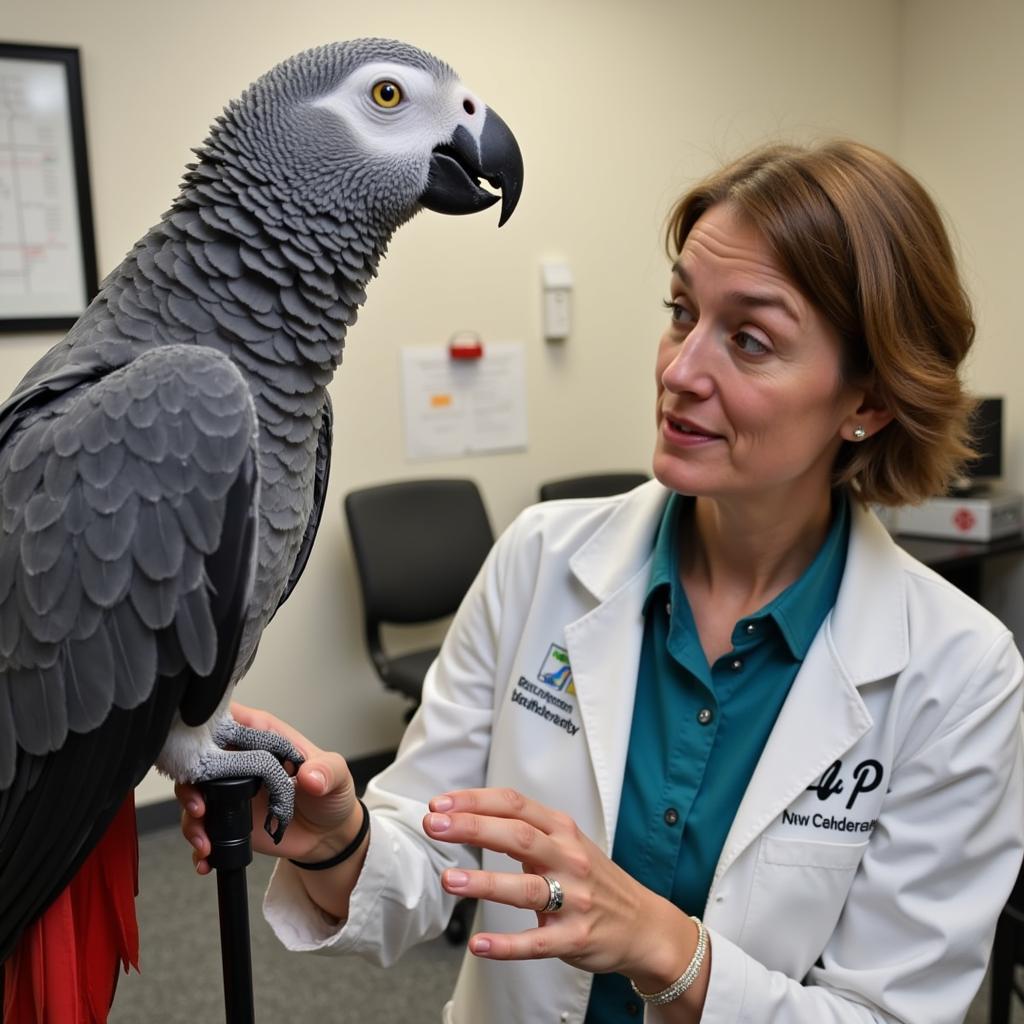African Grey Parrot: The Legacy of Alex and Dr. Irene Pepperberg
The African Grey Parrot, known for its striking silver feathers and bright red tail, has captivated the world with its intelligence. But beyond its beauty lies a remarkable capacity for cognitive abilities, brought to light by the groundbreaking research of Dr. Irene Pepperberg and her famous subject, Alex.
 Dr. Irene Pepperberg and Alex the African Grey Parrot
Dr. Irene Pepperberg and Alex the African Grey Parrot
Unlocking the Avian Mind: Alex’s Journey into Language
Dr. Pepperberg’s work with Alex transcended traditional animal training. She wasn’t interested in teaching tricks; she wanted to understand how parrots think. Through decades of rigorous study using a technique called the Model/Rival technique, Alex learned to communicate using English words. He could identify over 50 objects, distinguish colors and shapes, and even understand abstract concepts like “same” and “different.”
Alex’s abilities challenged long-held assumptions about the limitations of avian intelligence. He wasn’t simply mimicking; he was demonstrating genuine comprehension and the ability to apply knowledge in new situations. This groundbreaking research revolutionized our understanding of animal cognition and redefined what it means to be intelligent.
The Model/Rival Technique: A Partnership in Learning
Dr. Pepperberg’s success with Alex stemmed from the innovative Model/Rival technique. This method involved a trainer and a model (another human or sometimes even another parrot) who would interact with objects and engage in question-and-answer sessions. Alex, observing these interactions, learned by observing and participating in a social context, much like a human child.
This approach proved to be highly effective in fostering communication and cognitive development in Alex. He wasn’t just being trained; he was actively engaged in the learning process, a crucial element that contributed to his remarkable achievements.
Beyond Alex: A Legacy of Avian Research
Dr. Pepperberg’s work has had a profound impact on the field of animal cognition, sparking numerous studies on parrot intelligence. Her research continues with other African Grey Parrots, further exploring the depths of their cognitive abilities and shedding light on the evolution of language and intelligence across species.
African Grey Parrots: Conservation and Ethical Considerations
The remarkable intelligence of African Grey Parrots underscores the importance of their conservation. Sadly, these birds face threats from habitat loss and the illegal pet trade. As we marvel at their cognitive prowess, we must also advocate for their protection in the wild.
Furthermore, Dr. Pepperberg’s work raises important ethical questions about our relationship with intelligent animals. The ability to communicate and reason at such a level prompts us to reconsider how we treat these creatures and acknowledge their inherent value beyond their entertainment factor.
A Lasting Impact: The Future of Parrot Cognition Research
The legacy of Alex and Dr. Irene Pepperberg continues to inspire scientists and parrot enthusiasts alike. Their work serves as a reminder that the animal kingdom holds many mysteries yet to be unraveled and that even the most familiar creatures can surprise us with their intelligence and capacity for connection. As we delve deeper into the minds of African Grey Parrots, we gain a greater understanding not only of these fascinating birds but also of ourselves and the complex web of life we share.
FAQs
What is the average lifespan of an African Grey Parrot?
In captivity, African Grey Parrots can live for 40-60 years or even longer with proper care.
What makes the Model/Rival technique so effective?
This technique mimics the natural way parrots learn in the wild by observing and interacting with others. It encourages active participation and social learning, leading to more effective communication and cognitive development.
Are African Grey Parrots good pets?
African Grey Parrots require a high level of care and commitment. They are intelligent, social creatures that need ample mental stimulation, a spacious environment, and a nutritious diet. Owning an African Grey Parrot is a significant responsibility and not a decision to be taken lightly.

